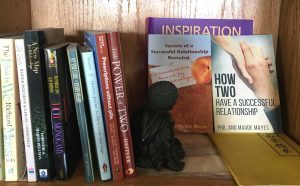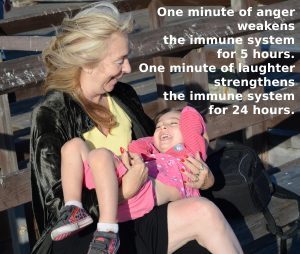Maude Mayes's Blog: Secrets of a Successful Relationship Revealed, page 85
September 13, 2017
Successful Relationships Reading Corner
 In this week’s blog, we write about the myth that differences cause problems in a relationship. Here are some articles that also discuss this topic.
In this week’s blog, we write about the myth that differences cause problems in a relationship. Here are some articles that also discuss this topic.
How the Differences in Your Relationship Can Be Gifts “It’s in our nature as humans to gravitate towards those who have interests similar to our own. And in many ways, this serves us well. On the other hand, it doesn’t leave much room for experiencing all that life has to offer…. By opening ourselves up to another way of living and being, we can make more educated decisions about what we want our own lives to look like. These varied life experiences allow us to express ourselves more fully and be more authentically present in the world.”
How To Understand Personality Differences… For Happier Relationships
“You are so disorganized.
No, I’m not. I’m flexible. You’re just being inflexible.
Which is it? Disorganized or flexible?
I’ve heard it both ways.
Here’s the thing. We’re always looking at the world through the lens of our personality style. And since people have this self-affirming bias, there is a tendency for them — a healthy one really — to value characteristics that they perceive in themselves. If I’m organized, I tend to view it as a valuable thing.”
Differences, incompatibilities and marriage success “What’s important is not so much the degree or type of difference. It’s how couples manage their areas of difference and incompatibility, and whether their relationship style is appropriate for the degree and type of differences and similarities that they have. It’s especially important that they take advantage of their areas of similarity to maintain a positive emotional tone. Couples must avoid becoming stuck in trying to convert their partner to adopt their viewpoint.”
September 10, 2017
The Myth of Difference Causing Problems in a Relationship
 For the last several weeks we have been writing about the popular myths of work and compromise concerning relationships.
For the last several weeks we have been writing about the popular myths of work and compromise concerning relationships.
Here are some of the types of statements even the most positive articles put forth:
“Our individual differences make friction between people we care about, inevitable.”
“The bad news is that some degree of effort and agony is inevitable in most relationships.”
“Relationships are hard work. They take compromise and sometimes you want to slap the other person. It’s a breeding ground for arguing.”
“No matter who you are with, you will run into some conflict. It’s simply part of being in a relationship.”
“Even if difference is the spice of life, at least as far as successful relationships go, you still have to deal with conflicts that emerge from these differences (just as perfectly-matched couples inevitably must).”
This week we would like to debunk another one of those myths that is deeply embedded in our minds and our culture. This states that differences between people in a relationship automatically cause distance, fighting, argument and estrangement. This myth suggests that there are ways to work around it, but that all couples will encounter this problem.
We think that these thoughts, which have been stated in so many ways, have become part of the group consciousness. Most people believe they are true as a result of hearing them stated as fact for so long.
But is it really true that differences are sources of inevitable conflict? Let’s take a closer look at that.
It is true that frequently, especially in the beginning of relationships, people seek others with the same interests. Whether you’re filling out a dating profile or making conversation at a party, you probably look at things in terms of what you have in common: “Likes beach walks, film noir, pinot noir and cats”; “Oh, I lived in Paris, too; which arondissement were you in?”
This seems like a good way to find compatible people, yet similar interests may mean different things to different people. Your prospective partner’s love of hiking may signal a reverence for nature, an obsession with fitness or a competitive streak. As relationships build, what becomes important is finding out whether or not you have shared core values. As we have stated over and over, this is a critical component of a successful relationship. You need to be sure that in both word and deed, you share the same ideals.
Is it true that differences are sources of inevitable conflict in relationships? No! #relationships
Click To Tweet
Often, people have it the wrong way round; they look for a match in surface interest, not a match in core values. It’s possible that the latter follows from the former; maybe an interest in animal rescue is a measure of empathy, but the real measure of core values is how the other person behaves, both day to day and in crises. It takes time to know someone well enough to make this assessment.
Once this is so, you will find that the very fact that your partner is different from you becomes an almost magical component of a joyful relationship. You are able to accept these differences because they are part of someone you love and trust. They can bring new activities and interests into your life that you would never have sought or become involved with on your own. You can learn new things and approach things you wouldn’t otherwise, because they are coming from or involve your partner. This makes them part of your life in a way that might never have occurred, and can often make things interesting and vital.
It is also an opportunity to look at yourself and learn more about yourself. When you are presented with a different way of approaching something, or a different way of doing something, this may cause you anxiety or discomfort. Look at that and find out why. It may be that you are holding on to something which you have actually outgrown or that doesn’t serve you any longer. It may be left over from past experiences, and your partner’s different ways may be a wake-up call to pull you into the present, or they may just be styles you’re not used to.
Either way, it’s still an opportunity to look at yourself. If you understand why something is important to you, you will be able to communicate it more easily to your partner, and it will not be an issue that is charged. There is no reason to have an emotional response to difference. Recognize what is happening for what it is, and then use it as a way for you and your partner to become more intimate.
Once you have mastered seeing differences as opportunities for growth and self-knowledge, you will find yourself being surprised over and over by the intimacy and depth of connection you wind up experiencing. Think about taking this way of relating out into the world. So much of what is happening on the planet today is about this very issue: how do we deal with difference? Is this something that adds to us or takes something away? This is a great way to spread peace, one relationship at a time.
September 6, 2017
Successful Relationships Reading Corner
 In this week’s blog, we say that compromise is not the way to success in relationships. Here are some articles about that, and our May 31, 2017 Reading Corner links on reaching mutual solutions also cover the topic of not compromising.
In this week’s blog, we say that compromise is not the way to success in relationships. Here are some articles about that, and our May 31, 2017 Reading Corner links on reaching mutual solutions also cover the topic of not compromising.
Should I Give Up Me to Not Lose You? “How far can you afford to bend your values to preserve your relationship? How far can you go in giving yourself up to avoid losing your partner? How much of yourself can you afford to sacrifice to not lose someone you love? How do we find the balance between maintaining our integrity and bending our values? Most relationships require us to bend to a certain extent, but how much can we bend without a loss of self?”
Are You Compromised In Your Relationships? “I look back at some of my past relationships and I compromised and was so compromised that I didn’t recognise myself. My boundaries would get battered, I’d forget about things that I valued, and I would morph to reduce the conflicts that were arising in my relationship, both between myself and the guy, and also within me. This was all in the hope that the payoff would be a happy relationship, however instead, I became so distanced from myself, it was like the real me was trapped inside begging to be let out.”
Good Compromise vs. Bad Compromise “About a decade ago, I dated a guy who … didn’t want me to attend my favorite morning yoga classes. He explained he did not want anything—other than himself—to bring me morning pleasure. So I stopped going (to make him happy and relaxed) and began drinking red wine (which made me happy and relaxed instead)”
September 3, 2017
Compromise is Not the Way to Success in Relationships
 Everybody copies each other. People take their cues for how to behave from all around, like a flock of birds that wheel in formation. It’s hard to accept this; everyone has a sense of uniqueness and independence, yet people constantly watch and copy each other. Acting differently would be seen as unpredictable, hence potentially unsafe, and invite rejection by the tribe. A good example is fashion, which only exists because of the way people copy each other. Bowler hats, anyone? Who’s for a mullet cut? Such conformity is, of course, a matter of degree. There are leaders, artists and rebels who imagine things differently and create social change.
Everybody copies each other. People take their cues for how to behave from all around, like a flock of birds that wheel in formation. It’s hard to accept this; everyone has a sense of uniqueness and independence, yet people constantly watch and copy each other. Acting differently would be seen as unpredictable, hence potentially unsafe, and invite rejection by the tribe. A good example is fashion, which only exists because of the way people copy each other. Bowler hats, anyone? Who’s for a mullet cut? Such conformity is, of course, a matter of degree. There are leaders, artists and rebels who imagine things differently and create social change.
Just as people take their cues of what to wear from other people, so do they take on what is acceptable couples behavior from relationship counselors.
In last week’s blog we addressed the myth that all relationships take hard work. Today we would like to discuss another concept pushed by relationship experts far and wide, and that is the idea that compromise is the way to find solutions in a relationship.
For us, this is a misleading and often destructive idea. The underlying principle of compromise is that you give something up in order to get something else. It is based on the belief that because each person in a relationship is different, that the partners will have to deny their wishes in order to make their partner happy and keep peace in the relationship.
This could not be further from the truth. Difference can be experienced as enrichment, as something that gets added, rather than something which presents problems that call for sacrifice. We have found another path, one which continually surprises us with its wonderful results.
People say compromise is the way to find solutions in a relationship. They’re wrong #relationships
Click To Tweet
We call this Our Process, and it is described thoroughly in our latest book, “How Two: Have a Successful Relationship.” This process is a way to find mutual solutions. We describe a way you can talk with each other and an attitude you can use to work on problem solving and decision making that is founded on the understanding that you are looking for something that will work for both of you without either giving anything up. It is based on the knowledge that you are on the same side, want the same things for yourselves and each other, and are willing to be flexible enough to realize that your way may not be all there is.
It’s not like solving a crossword puzzle where there is only one correct solution. (A notable exception is the 1996 New York Times election-day crossword where the clue “Lead story in tomorrow’s newspaper” could be filled in as BOBDOLE ELECTED or CLINTON ELECTED.) It’s more like our plan to drive to Yellowstone where we can choose any number of routes.
It does require that you are in agreement on core values. If you have a wanderlust and your partner is a homebody, there may not be a solution that works for both of you. Kids, money, lifestyle – sometimes you both want different things, but when you have the same vision for life, there is always, always, a way to find mutual solutions.
Flexibility is key to the process. By entering into a dialogue in which each of you share what you want, and by giving the details of what is behind that desire, what the components are of what you are actually looking for, a clearer understanding will arise between the two of you. Listening and staying open are necessary to this experience. You must be open to other possibilities. Don’t hold on to your original position through stubbornness; don’t feel that looking at alternatives is an admission that you are wrong.
Sharing in this open manner, with no attachment to the outcome, invariably results in an almost magical occurrence. Out of the intimacy of this kind of exchange, something new arises. It is not the original idea of either of you, but rather something better, encompassing the desires of both of you. It is like a child created together, with all of both of you and more! This is what we mean by finding mutual solutions.
Once you have this experience, you will want more of it. You will enter these discussions happily with no expectation other than that you know at the end, you will come out with more than you went into it with, not less!
August 30, 2017
Successful Relationships Reading Corner
 In this week’s blog, we say that having to work hard in a relationship is a myth. A funny thing happened when we looked for links. Almost all of the articles described the “myth” as being the other way around: that relationships actually do need work. Here are some rare exceptions that disagree.
In this week’s blog, we say that having to work hard in a relationship is a myth. A funny thing happened when we looked for links. Almost all of the articles described the “myth” as being the other way around: that relationships actually do need work. Here are some rare exceptions that disagree.
Seven Reasons Why Relationship Feels So Hard Sometimes “Relationships are complex. In a partnership, you have two individuals, with different personalities, ways of relating, expectations, and desires; not to mention differences in family upbringing, gender, culture, class, and beliefs. The list of ways you and your partner can be different is lengthy, but the point is that there are going to be times when you and your partner have vastly different perspectives. When encountering such difference, it is natural and normal to experience discomfort and feel as though there is a problem. However, differences are not inherently bad. They do not have to result in power struggles, arguments, and threats to the relationship.”
The Biggest Relationship Myth “It’s hard to avoid it, the biggest relationship myth. Everyone tells it to us. Family, friends, chick flicks, books, magazines, music lyrics – heck, we even propagate this myth to ourselves.
Relationships are hard work.
Relationships aren’t supposed to be simple.
Relationships are messy.
Or, as Coldplay simply puts it, “Nobody said it was easy.”
Wait, you’re wondering, how is this a myth? Relationships are hard work. Good relationships aren’t supposed to be easy. My relationship is messy. Before you angrily close the page or write me an irritated comment, hear me out.”
An 81-year marriage is impressive, but it shouldn’t be fetishised “I find the ‘relationships are hard work’ mantra questionable at best, and harmful at worst. There are many with vested interests in keeping people, particularly women, in unhealthy relationships to preserve social order. Relationships shouldn’t be hard work. Relationships survive because of luck and happy willing effort. I have seen people work their guts out and grow apart, and others cruise along, happily growing around each other like trellised roses.”
August 27, 2017
Do You Have to Work Hard in a Relationship?
 Since words truly have power, we have decided it’s time to tackle some of the misleading words we are inundated with concerning relationships. We are bombarded with information that tells us relationships inevitably have conflict, that we have to work hard in a relationship and that compromise is the path to success. This week and next week we will discuss two of the prime propaganda words applied to relationships.
Since words truly have power, we have decided it’s time to tackle some of the misleading words we are inundated with concerning relationships. We are bombarded with information that tells us relationships inevitably have conflict, that we have to work hard in a relationship and that compromise is the path to success. This week and next week we will discuss two of the prime propaganda words applied to relationships.
How many times have you heard that relationships need work, lots of work, hard work? We challenge this and further state that it’s another of those dangerous myths that perpetuate a misleading view of relationships. Its metaphor is that there is a spring between you that sporadically pushes you apart, and you have to struggle and work against this force in order to stay together.
In our experience of successful peaceful relationships, different forces apply. When your core values match, a prerequisite for any relationship that will have enduring potential, then your differences are not a negative issue. They are not a challenge to you, so you do not need to work to accept them. Your differences will be an addition to both of you, and a source of constant growth and enrichment. The uniqueness of each of you will bring discovery, humor, and will be a continuous source for fresh new experiences, that alone you could never have.
Many say relationships inevitably have conflict & need hard work. This is not so. #relationships
Click To Tweet
A better metaphor is a rubber band that pulls two people together. We are by nature a cooperative species, gaining great benefit from working together and specializing in different skills, and relationships are the same, with the additional attractions of companionship, intimacy and sex.
But relationships also fall apart or develop combative behavior patterns, and a variant of the spring metaphor is useful here: each person has their own spring which makes it difficult to get close to their partner, and here is where the word “work” does apply. You have to work on yourself; you have to find that spring and tackle it.
This involves self-reflection, and most of us are not very good at that. It’s tough. How can you see yourself without a mirror? Other people can be that mirror by saying how they see you, but they may be reluctant to speak honestly, their view may be distorted, or you may refuse to believe them.
Even so, they are only words, and it’s feelings that are really driving the bus. Sit down by yourself and explore them. Don’t resist them, don’t judge them, don’t act on them. Say Hi. Own them. They are your feelings. But they are not you; they are an aspect of you. When the storms have blown away, underneath them is you. Not the idea of you or your name or your profession or any identity. Find that place and live from it as much and as often as possible. Wash, rinse, repeat. That is how personal growth happens. That is the work.
August 23, 2017
Successful Relationships Reading Corner
 In this week’s blog, we wrote about how to stay connected by accepting your partner. These links give a variety of thoughts about this topic.
In this week’s blog, we wrote about how to stay connected by accepting your partner. These links give a variety of thoughts about this topic.
Marriage Help: Do You Accept Or Tolerate Your Partner? “When your partner tolerates you (or, more accurately, tolerates something about you), s/he has to continuously expend energy in order to suppress feelings of judgment and criticism. In short, when you tolerate your partner, you will find that you’re frequently biting your tongue and sooner or later, you’ll erupt in frustration or anger. Acceptance, on the other hand, implies an openness to the other person, an openness to the differences that exist between you and your partner. When you accept your partner, you see and appreciate his/her uniqueness, and there is no need for emotional resistance—there is no withholding, no need to emotionally hide from one another.”
A Lasting Romance Is Built on Flaws: 6 Tips for a Strong Relationship “It’s human nature to size up a potential partner by drawing from past experience. There are so many ways to catalog the possible flaws: He’s too short. She’s too tall. Too fat. Too thin. Not enough education. Too much education. Or you become judgmental about how much your date eats or drinks or how they interact with other people. The perceived flaws get in the way of making a connection. It’s like the three bears’ approach to dating, looking for that partner who is “just right.” Too often we make the mistake of looking for a mirror of ourselves in a partner.”
Emotional Connection: What it is and how to get it “What is emotional connection? It’s an overused term that means many things. In this context, emotional connection is not just affection, terms of endearment, or closeness in day-to-day living. Rather, it is the knowledge that your partner empathizes with you and will turn toward you when you need them. Emotional connection is the kind of primal safety you get from knowing that you are seen, valued, and comforted in your most vulnerable moments.”
August 20, 2017
How to Stay Connected by Accepting Your Partner
 We’ve had a very busy week. Maude had mid-month reports and a flood of uncommon work issues, and Phil took on some programming work, which for him is all-consuming. But we noticed last night that through it all, none of this affected our connection with each other; we didn’t withdraw into ourselves or snap at each other. In fact, the times we spend with each other help us move through turbulent times with equanimity because they remind us of who we are. When we are with each other, there are no barriers; we can be ourselves, whether that is anxious, sexual or joyous, and we can be like that because we accept each other fully. We take this sense of ourselves out into the world like a shield; the events of the day might affect how we are, but never who we are.
We’ve had a very busy week. Maude had mid-month reports and a flood of uncommon work issues, and Phil took on some programming work, which for him is all-consuming. But we noticed last night that through it all, none of this affected our connection with each other; we didn’t withdraw into ourselves or snap at each other. In fact, the times we spend with each other help us move through turbulent times with equanimity because they remind us of who we are. When we are with each other, there are no barriers; we can be ourselves, whether that is anxious, sexual or joyous, and we can be like that because we accept each other fully. We take this sense of ourselves out into the world like a shield; the events of the day might affect how we are, but never who we are.
This is the point at which you’re probably grumbling “How wonderful for you, Mr. & Mrs. Home & Garden Perfect; how about real life?” We’re not trying to boast here; we want to inspire by saying good relationships are possible. Often people think their problems are with their partner, and if only X (and maybe Y and Z) were different, things would be perfect.
Assuming your core values match, you have to accept your partner totally #quote #relationships #blog
Click To Tweet
Here’s the bad news: assuming your core values match, then you have to accept those things and live with them; you have to accept your partner totally. (There’s one important caveat: this doesn’t include abuse, whether verbal or physical, and unfortunately, people often find that hard to recognize, instead blaming themselves. Check with a trusted friend to make sure this isn’t the case for you.) And how do you practice such acceptance?
Think about what lies behind your reactions. Take untidiness, for example. Are you uneasy when things are not in their place? Is it disgust at dirty clothes lying around? If you’re OK making the same mess, maybe it’s not having control over your environment. Dig as deep as possible. The very act of naming your reactions will clarify the situation, and maybe your partner will react differently when (s)he hears the deeper reasons.
Think wabi-sabi, the Japanese appreciation for imperfection. This is part of what makes your partner who they are: they won’t ask for directions, they fart in bed, they can’t stand cigarette smoke. They are as distinctive as the chips and the loose foot on Phil’s grandmother’s kitchen timer.
Think half-full, not half-empty. Your world becomes what you look at. When you look at your partner – or anyone! – in terms of their flaws, you are guaranteed to be dissatisfied. Ask anyone on their 5th marriage about their spouse. More than likely they haven’t found the right person yet; instead of X, Y and Z, it’s J, K and L that bug them.
Your partner is a smorgasbord of characteristics. Enjoy the brie with strawberries and skip the cottage cheese. (Apologies to cottage cheese fans.)
The good news is that all this is possible, and it’s your choice. Believe that a good relationship can be created, then go out and make it happen.
August 16, 2017
Successful Relationships Reading Corner
 In this week’s blog, we wrote about how to handle anger in your relationship. These links discuss how to deal with both your anger and that of your partner.
In this week’s blog, we wrote about how to handle anger in your relationship. These links discuss how to deal with both your anger and that of your partner.
Anger in Relationships: Owning Yours, Softening Your Partner’s “Anger is not a sign that your relationship is doomed to fail. Anger is an emotion that we all experience, and it signifies that something has to be done. Anger makes you aware that there is a problem. How you deal with your anger can become a big part of the problem. For some couples, anger can make it nearly impossible to figure out what the problem is and how to fix it. For most couples, anger itself is not the problem. What becomes problematic is how partners deal with their anger and how well they deal with their partner’s.”
Dealing with Anger in a Relationship “Most days, we can conceal our anger from people at work or at school. But this “beast within” is practically impossible to hide from our significant other. Some of us respond to this vulnerability by lashing out at our partner. Others retreat and coil tight emotionally. Neither of these reactions, however, leads to a healthy relationship. The appropriate response is more human … and requires more courage.”
How to Deal With an Angry Partner “The biggest challenge of living with a resentful or angry person is to keep from becoming one yourself—or else, the high contagion and reactivity of resentment and anger are likely to make you into someone you are not. The second biggest challenge in staying in a relationship with a resentful or angry person is trying to get him or her to change.”
August 13, 2017
How to Handle Anger in Your Relationship
 A friend asked about handling anger in the context of a conflict-free relationship. If the anger is coming from you, first put it into words. Naming emotions is a great way to control them; the more specific, the better. If you’re running around like crazy and can’t even say why, you can’t take charge of it. Susan Heitler writes:
A friend asked about handling anger in the context of a conflict-free relationship. If the anger is coming from you, first put it into words. Naming emotions is a great way to control them; the more specific, the better. If you’re running around like crazy and can’t even say why, you can’t take charge of it. Susan Heitler writes:
The ability to label feelings is a key ingredient of emotional maturity. Naming a feeling is like catching and harnessing a horse. Unharnessed, unnamed, the horse or the feeling can run wild. Caught and held, they become helpfully at your service. When both you and your partner have the ability to label and therefore talk about your feelings, your power to use feelings constructively for the both of you increase. “The Power of Two” p.43.
Once you’re clear on what you’re feeling, you need to own it: “I feel angry because…” not “You make me angry because….” This turns it from an accusation into a confession; you can become closer through sharing, rather than distant through fighting.
How we (all of us) respond to and treat each other depends on what we’ve learned, and we all pretty much have a previous trauma story or three. We (Phil and Maude) have done our share of cushion bashing, but it’s not clear how useful the cathartic encounter group approach to emotions is. It explores and names the feelings that contribute to the way we are today, and that naming is good (see above), but the bottom line is that it’s all history, and we need to respond according to what is actually happening.
Last week we discussed a couple we know who have been together a long time. Her behavior is often snippy and it probably feels to her partner like she is angry when this happens. The strange thing is, she isn’t. These are old behavior patterns that haven’t been addressed and removed, even though they no longer apply. She raises her voice, she has an aggressive body stance, she stays at a distance and not in physical contact with her partner when these episodes occur.
This kind of behavior can cause a corollary defensive response, and before you know it, you are both at odds with each other!
Setting aside our earlier wrong learning is a tough request; it’s like parents flummoxed by New Math. Maybe we’re seeing a shadow from the past in our partner, or maybe being angry (or sad/lonely/scared) is familiar and hence comforting, even while being painful. Transitioning into a peaceful relationship is like exploring unfamiliar territory for many people.
When your partner is angry, don’t react. Be a rock in the stream; let it flow over you #quote
Click To Tweet
If the anger in your relationship is coming from your partner, here’s the trick: don’t react. It’s their anger, not yours. Don’t get sucked into it, and don’t buy the argument that anger is a sign of passion. Anger isn’t a sign of caring; it’s a sign of being angry. Phil had a revelation in an earlier relationship with a tempestuous woman: he became a rock in a stream, letting it wash over and around him. That simple change of viewpoint is revolutionary. Acknowledge their anger, but don’t make it your job to fix it. (Unless, of course, you actually did leave the cake out in the rain.)
For us, we don’t have anger in our relationship. It’s simply that we don’t want to go there, so we don’t. We’re both aware of when we’re not in harmony, and one of us will address it. There’s no reluctance to do so, because our repeated experience is that we can do this without it becoming a me vs. you struggle, and that it always ends up being a rewarding experience. You too can live peacefully with a conscious mutual decision to do so, and by applying awareness to your own behavior. Good luck!
Secrets of a Successful Relationship Revealed
We use this blog to continue the exploration of the magic that can be found in a relationship, and the wider implications of peace for the world. ...more
- Maude Mayes's profile
- 8 followers



